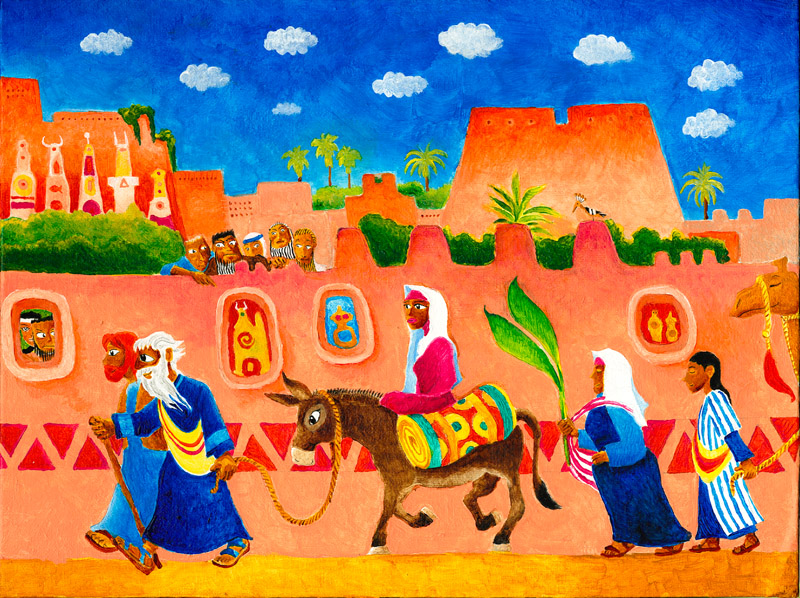|
|
Bonjour / Hello [nickname_else_first_name],
Table of contents
1) Perashat Hashavoua - Rabbi Eli Mansour
2) Halakhat Hashavoua (Halakhot related to day to day life) - Hazzan David Azerad
- The Laws of Reciting the Blessing of the moon Joyously
3) Holy Jokes!
4) FOR KIDS!

This Week's Parasha Insight with Rabbi Eli Mansour
Parashat Noah- Noah and Abraham
The Torah in the opening verse of Parashat Noah describes Noah’s piety with two adjectives: "Sadik" and "Tamim." Later (7:1), however, just before the flood, G-d instructed Noah to enter the ark "because I have seen that you are a ‘Sadik’ before Me in this generation." Whereas initially Noah is described as both a "Sadik" and a "Tamim," he is now described as only a "Sadik." Why?
The Bet Yosef (Rav Yosef Karo, author of the Shulhan Aruch, 1488-1575) explains that "Sadik" and "Tamim" refer to Noah’s resistance to the evil that characterized two different ages. Noah lived both during the generation of the flood, whose sinfulness involved mainly the area of Arayot (forbidden intimate relationships), and during the generation of the Tower of Babel, who sinned by lacking faith in G-d. The Torah therefore says that Noah was a "Sadik" – referring to his avoiding sins of Arayot – and a "Tamim" – referring to his unwavering belief and faith in G-d. When the Torah first introduces Noah, it praises him for being a "Sadik" even in a time of widespread promiscuity, and for later being a "Tamim" during a time of widespread heresy. But when G-d spoke to Noah right before the flood, He told Noah that he would be saved "because I have seen that you are a ‘Sadik’ before Me in this generation." The relevant point at this time was his being a "Sadik" in contrast to the people of that generation, not the fact that he would later prove to be "Tamim."
The Kerem Shelomo (Rav Shelomo Halberstam of Bobov, 1908-2000) offers a different explanation. He suggests that a "Sadik" is a person who builds himself into a righteous individual, whereas a "Tamim" – "complete person" – is someone who also seeks to teach, inspire and influence others. The Kerem Shelomo proves this meaning of the word "Tamim" from the famous verse in Tehillim (19:8), "Torat Hashem Temima Meshibat Nafesh" (literally, "G-d’s Torah is complete, restoring the soul"). The Torah is called "Temima" (the feminine form of "Tamim") when it succeeds in "Meshibat Nafesh" – returning souls, inspiring people to repent and grow. One’s Torah becomes "complete" when it impacts others. The description "Tamim," then refers to a pious person’s efforts to teach and inspire the people around him.
Initially, the Kerem Shelomo writes, Noah was both a "Sadik" and a "Tamim." He was personally righteous, and he also invested effort to try to have an impact upon the sinful people of time. However, these efforts did not meet with success. His contemporaries ridiculed and scorned him. And so Noah despaired, and withdrew. He stopped trying to have a positive influence on the people around him, and so he remained just a "Sadik," no longer being a "Tamim."
Rashi, commenting to the opening verse to Parashat Noah, cites those who comment that had Noah lived in the time of Abraham Abinu, he would not have been considered especially righteous. Although he was considered pious in his generation, he would not have been regarded as such in Abraham’s generation. The reason, the Kerem Shelomo explains, is because Abraham persisted in his efforts to influence his contemporaries. He suffered no less hostility than Noah did. In fact, the Midrash relates that Abraham’s own father turned him over to the authorities and had him sentenced to execution for destroying idols. Unlike Noah, however, Abraham did not despair. He persisted, determined to do everything he could to spread the belief in G-d and influence the people of his time. This is why Noah was considered lesser than Abraham. Although they both made heroic efforts to influence the people of their respective generations, Noah stopped when these efforts did not succeed, whereas Abraham kept trying.
The Mishna in Pirkeh Avot (2:8) teaches, "Im Lamadeta Torah Harbeh, Al Tahazik Toba Le’asmecha, Ki Lechach Nosarta," which is commonly understood to mean, "If you learned lots of Torah, do not take pride in yourself, because for this you were created." In other words, one should not feel excessively proud over his accomplishments in Torah learning, because he has simply fulfilled the purpose for which he was created. However, Hacham Baruch Ben-Haim explained that this Mishna could be read to mean that an accomplished Torah scholar must not hold ("Tahazik") the "goodness" ("Toba") – the precious Torah he studied – to himself ("Le’asmecha"). Rather, he should use his knowledge and insight to try to influence others, "because for this you were created" – we are here to make a positive impact upon the world.
The difference between Noah and Abraham teaches us that we must remain committed to this goal even if our efforts do not at first appear fruitful. Even if we encounter hardship and resistance in our efforts to spread Torah and inspire people, we must not despair. We must always remember that "because for this you were created," we are here to help improve the world, and so even when this proves difficult, we must follow the example of Abraham Abinu and persist, continuing to expend whatever efforts we can to have a positive influence upon the people around us.

The Laws of Reciting the Blessing of the moon Joyously
(peninei Halacha)
Because of the exalted themes behind the moon’s renewal, the person who recites the Blessing of the Moon is considered as one who receives God’s Presence (the Shechinah). Thus, Tanna Devei Rabbi Yishmael states, “Had the Jews been privileged to greet their Father in Heaven only once a month (when reciting Birkat HaLevana), it would be sufficient” (Sanhedrin 42a). Therefore, Abaye concluded that one must honor the blessing and recite it while standing . One who finds it difficult to stand should lean on his cane, or on a friend, and recite the blessing. If leaning is too difficult, he may say it while sitting.
The custom is to honor the blessing by saying it with a minyan. In the absence of a minyan, it is best to say it in a group of three, but according to the letter of the law one may recite it alone. If one is concerned that waiting for a day on which a minyan can be gathered will cause him to forget to say the blessing altogether, it is preferable not to wait, and to say it alone (Biur Halacha 426:2).
It is customary to leave the synagogue or one’s house and recite the blessing under the open sky. We learned above that Birkat HaLevanah is compared to greeting the Shechinah. Therefore, just as one goes out to greet a king, one should go out to recite this blessing. A person who is sick, or fearful that he might catch a cold if he ventures outside, may glance at the moon through a window and say the blessing indoors (Mishna Berura 426:21).
In order to honor the blessing, which contains an aspect of greeting the Shechinah, we are accustomed to recite it immediately after Shabbat, when we are joyful and nicely dressed . However, if there is reason to fear that waiting until Saturday night will cause us to miss the opportunity to say the blessing, it is preferable to say it on a weeknight (Shulchan Aruch, Rama 426:2).
The custom is not to recite Birkat HaLevana on Friday night, in order to avoid mingling the joy of Shabbat with that of Birkat HaLevana. However, if there is reason to fear that one will miss the blessing if he does not say it on Friday night, he should recite it then (Rama 426:2, Mishna Berura 12).
As we already learned, the moon alludes to Knesset Yisrael (the Assembly of Israel). Knesset Yisrael is like a bride before God, and “she” renews and purifies herself every month, just like a bride does for her husband. This strengthens the bond between Knesset Yisrael and HaKadosh Baruch Hu. And when all of the world’s flaws are remedied, everyone will recognize the special relationship that exists between Israel and the Holy One Blessed be He, as it says, “Like a bridegroom rejoices over a bride, so will your God rejoice over you” (Yeshayahu, 62:5). Therefore, a custom developed to dance and sing after Birkat HaLevanah, just as at a wedding. Along the same lines, there is a custom to raise up a bit when saying, “Just as I dance before You…” (Rama 426:2).
Since we must say the blessing joyously, we do not recite it before Tish’a B’Av – because of our mourning over the Temple’s destruction – nor before Yom Kippur, due to our anxiety over the upcoming Day of Judgment. We do say it, however, immediately after Yom Kippur, even though we have not yet eaten, because we are joyous over having had the privilege to stand before God in penitence. Some say that It is proper to postpone Kiddush Levanah until the night after Tish’a B’Av, or until people have had a chance to eat and drink and leave their state of mourning (Rama 426:2) Some however will say it on Tish'a B'Av. However, if it will be difficult to gather a minyan later on, a congregation may sanctify the moon immediately after the fast is over (Mishna Berura 426:11, Sha’ar HaTziyun 9;).
Similarly, one who is sitting shiva should push off reciting the blessing until after the shiva, if possible, because he is grieving, even if he will have to say it alone. If, however, he cannot push it off – because shiva will end after the permissible time to say the blessing – he should say it during his mourning period (Mishna Berura 426:11, Kaf HaChaim 5. The latest time to recite the blessing is on the 15th of the month in the Jewish calendar.
Bevirkat Shabbat Shalom Umevorach
David Azerad
3) HOLY JoKeS!!
Selection of funny snippets, loosely related to this weeks parashah or current events, to brighten your day



4) FOR KIDS
13 facts about noah's ark
https://www.thefactsite.com/noahs-ark-facts/
Click on the image to open the youtube video


|
|
|
|
















